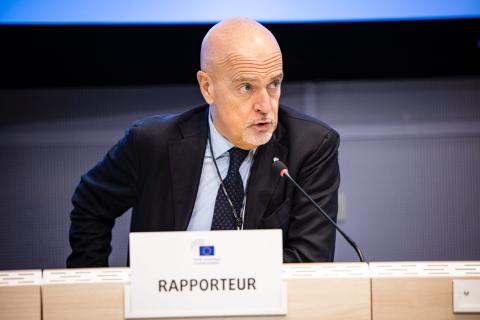European Economic
and Social Committee
Empowering regions to drive the EU’s Territorial Agenda 2030
In an opinion adopted in plenary, the European Economic and Social Committee (EESC) made key recommendations to advance the EU’s Territorial Agenda 2030. The strategy should promote cohesion and the ‘freedom to stay’ in one’s home, align with cohesion policy to reduce disparities, and drive sustainable growth, while increasing civil society participation in regional development.
The European Union faces challenges – economic, social, and environmental –that hinder the growth of certain regions. While the Territorial Agenda 2030 aims to address these issues by promoting balanced development across the EU, its full potential has not been realised. Limited resources and the trend toward centralisation in the single market make it harder to ensure equal benefits for all regions. While the Territorial Agenda 2030 is designed to help, its impact at local level remains insufficient.
Fair and balanced growth
A central goal of the Territorial Agenda 2030 is to ensure that everyone, regardless of location, has access to the resources needed for a fulfilling life. The EESC stresses that the strategy must not only facilitate mobility across the EU, but also ensure people have the ‘freedom to stay’ in the places they call home. This means access to quality public services, strong transport networks, and a high quality of life – whether in a bustling city or a rural village. To achieve this, regions must receive investments in innovation, entrepreneurship, and digitalisation, enabling them to compete globally and offer more local development opportunities, ensuring every region has the tools to thrive.
Coordination between policies and funding
Although the Territorial Agenda 2030 aligns with the EU’s broader goals of a greener, fairer Europe, the EESC points out that its benefits are not fully realised at local level. Better coordination is needed between the Territorial Agenda and other EU policies, particularly cohesion policy, which helps fund projects in regions most in need.
'We need better coordination between these policies,' says EESC rapporteur Stefano Palmieri. 'When the Territorial Agenda 2030 and cohesion policy are aligned, regions receive stronger support to reduce disparities and foster growth. This approach ensures that financial resources are used efficiently and that regions can fully capitalize on both frameworks.'
Involving civil society and local communities
The success of the Territorial Agenda 2030 depends not only on top-down planning but also on active engagement with local communities. The EESC stresses that civil society – including local citizens, social partners and vulnerable groups – must play a larger role in shaping policies that impact their lives. When these groups are involved, policies are more likely to meet the real needs of people in different regions. The EESC also calls for more inclusive decision-making processes, ensuring that everyone, especially vulnerable groups, has a voice in shaping the future of their regions.
Building resilience
The world is changing rapidly, with crises like the COVID-19 pandemic, climate change and economic instability affecting regions across Europe. The EESC emphasises that the Territorial Agenda 2030 must prioritise resilience, helping regions prepare for future challenges. Whether social, environmental, or economic disruptions, regions need strategies to adapt and thrive. By making resilience a core focus, the Territorial Agenda 2030 can help regions weather crises and ensure long-term sustainability.
Integrated regional development for long-term success
The EESC calls for a more integrated approach to territorial development, combining social, economic, and environmental factors to support each region’s overall well-being. Local development should be balanced, focusing on sustainable solutions that benefit both urban and rural areas. This integrated approach ensures that regions grow harmoniously with the environment and their people’s needs, fostering a more sustainable Europe for the future.
Strengthening skills and governance
For the Territorial Agenda 2030 to succeed, local and regional governments need the right skills and resources. The EESC recommends providing training and support to civil servants and administrators, helping them address the complex challenges their regions face. This will ensure that the Territorial Agenda is effectively integrated into local policies. In addition, the EESC highlights the importance of participatory decision-making. Local governments must collaborate closely with stakeholders, including citizens and civil society organisations, to ensure that everyone plays a role in shaping their region’s future.
The Territorial Agenda 2030 offers a valuable framework to ensure that all regions in the EU have the opportunity to thrive. By focusing on fair development, resilience, and local involvement, the EESC’s recommendations strengthen the Agenda’s impact. If fully implemented, these recommendations will help create a more cohesive, sustainable, and prosperous Europe, where every region and citizen has the chance to succeed.
